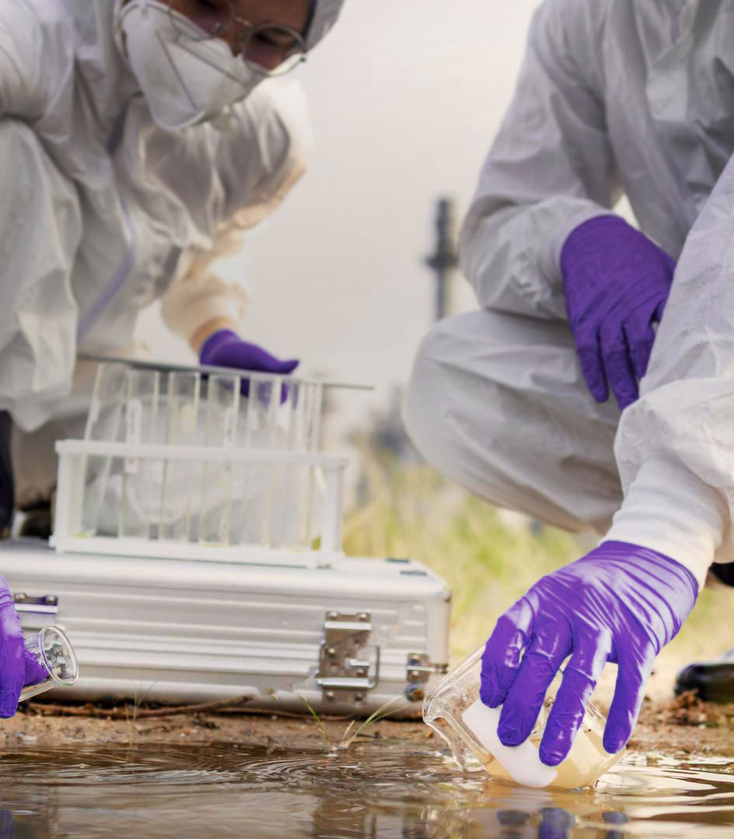
MPH IN ENVIRONMENTAL PUBLIC HEALTH
Full-Time Study
Part-Time Study
The Master of Public Health (MPH) in Environmental Public Health concentration, housed within the Department of Global and Environmental Health, stands at the critical intersection of environmental science and global urban health. Here, you will move beyond the classroom to explore the urgent connections between the health of our planet and the health of our populations—tackling issues ranging from climate change and sustainability to urban geopolitics.
We prepare you to meet the growing global marketplace demand for expertise in environmental research and practice. You will graduate with the rigorous skills needed to analyze complex issues and implement sustainable, equitable, scalable solutions.
The GPH Environmental Public Health Experience
- Global Exposure: Gain on-the-ground perspective through elective courses in locations such as London and Tanzania.
- Diverse Career Paths: Our alumni thrive in NGOs, health departments, academia, consultancy, data science, and health communication.
- Supportive Community: Experience the benefits of a close-knit program where accessible faculty and supportive colleagues actively enrich your MPH journey.
Where Our Alumni Work
| Job Title | Employer |
| Associate Manager for Corporate Social Responsibility | KnitWell Group |
| Communication and Campaign Specialist | National Center for Healthy Housing |
| Emergency Management and Response Specialist | APTIM |
| Energy Analyst | FirstService Energy |
| Environment, Health, and Safety Manager | Suncoast Rust Control |
| Environmental Compliance Inspector | City of St. Augustine |
| Senior Environmental Investigator | Microecologies |
| Sub-Regional EHS Specialist, Occupational Health and Safety | US Customs and Border Control |
| Wastewater Surveillance Response Epidemiologist | Colorado Department of Public Health and Environment |
Environmental Public Health Concentration
Key Skills
When you graduate with the Environmental Public Health concentration, you’ll be prepared to take on leadership roles in public health settings around the globe. You’ll stand out to employers with a skillset that has both breadth and depth, including the following competencies.
- Describe the origin and pathways of contaminants in the environment and the mechanisms through which they are introduced
- Identify the direct and indirect effects of environmental hazards on humans and ecological systems
- Assess the qualitative and quantitative aspects of exposure, dose response, and risk characterization of environmental agents
- Critically evaluate, synthesize, and interpret scientific findings in the environmental health literature, including relevant topics in epidemiology, toxicology, engineering, and medicine
- Specify approaches for assessing, preventing, and controlling environmental hazards that pose risk to human health and safety
- Define the role and impact of national and international environmental health regulatory programs, agencies, and organizations
Professional Development
You will benefit from countless opportunities to build skills and experience to prepare you for successful careers in public health and environmental health sciences. There are many professional development opportunities available to you at NYU GPH, including internships, fellowships, employment, volunteer opportunities, professional association membership, and more.
All students in the Environmental Public Health track take the follow core courses (18 credits) as part of the MPH degree requirements:
GPH-GU 2030 Introduction to Global Health (2) [F, S]
GPH-GU 2106 Epidemiology (3) [F, S]
GPH-GU 2140 Global Issues in Social & Behavioral Health (3) [F, S]
GPH-GU 2110 Health Care Policy (2) [F, S, Su]
GPH-GU 2112 Public Health Policy and Management (2) [F, S, Su]
GPH-GU 2153 Global Environmental Health (3) [F, S, Su]
GPH-GU 2995 Biostatistics for Public Health (3) [F, S, Su]
GPH-GU 5171 Global Health Informatics Workshop (0) [F]
GPH-GU 5170 Introduction to Public Health (0) [F, S]
All students in the Environmental Public Health track take the following courses:
GPH-GU 2136 Fundamentals of Global Health and Development (3) [S]
GPH-GU 2265 Climate Change and Global Public Health (3) [F]
GPH-GU 5210 Global Health Disaster Preparedness & Response (3) [S]
GPH-GU 2280 Environmental Health Assessments & Interventions (3) [S]
All students in the Environmental concentration select 12 credits of public health electives from the following list:
(students can register directly on Albert unless otherwise indicated)
GPH-GU 9245 A Systems Approach to Climate Change (3)
CE-GY 7523 Air Pollution (strong chemistry background required) (3)****
ENYC-GE 2005 Cities and Their Environments (3)
CE-GY 7913 Climate Science: Realities & Risks of a Changing Climate (3)***
GPH-GU 2229/5229 Commercial Determinants of Health: A focus on tobacco, alcohol, and industrial food (3) [S]
GPH-GU 3260 Complex Systems, Disasters, and the Social Ecology of Health (3) [S]
PADM-GP 4414 Corporate Philanthropy and Engagement (1.5)*
GPH-GU 2242 Crisis and Emergency Risk Communications (3) [S]
GPH-GU 2232 Detection and Control of Waterborne Pathogens (3) [S]
GPH-GU 5150 Emergency Preparedness for Healthcare Organizations (3) [Su]
GPH-GU 2440 Emerging Disease and Bioterrorism (3) [S]
GLOB1-GC 2405 Energy, Environment, and Resource Security (3)
EHSC-GA 2309 Environmental Carcinogenesis (4)**
ENYC-GE 2022 Environmental Education: Theory and Practice (3)
CE-GY 7673 Environmental Impact Assessment (3)***
URPL-GP 2625 Environmental Infrastructure for Sustainable Cities (3)*
GPH-GU 2211 Environmental Justice and Global Health (3) [S]
ENYC-GE 2018 Environmental Justice through Digital Empowerment (3)
ENYC-GE 2021 Environmental Politics (3)
CE-GY 7753 Environmental Systems Management (3)***
ENYC-GE 2019 Fundamentals of Environmental Thought (3)
URPL-GP 2618 Geographic Information Systems and Analysis (3)*
GLOB1-GC 2518 Geographic Information Systems for Global Affairs (3)
EHSC-GA 1010 Global Climate Change, Air Pollution, and Health (4)**
GPH-GU 2130/9130 Global Health Diplomacy (3)
GPH-GU 5342 Global Issues in Public Health Nutrition: Climate, Sustainability, and Food Security (3) [S]
GPH-GU 2319 Grant Writing to Fund Public Health Research (3) [S]
GPH-GU 2237 Health Economic Evaluation and Health Technology Assessment (3) [S]
GLOB1-GC 2130 The Integration of Profit & Purpose: Corporate Social Responsibility, Sustainability (3)
GPH-GU 2224/9224 Introduction to Urban Health and Equity (3) [January or Spring]
GPH-GU 5270 Management of Public Health Disasters (3) [F]
CE-GY 6053 Monitoring Cities (3)***
GPH-GU 3120 Navigating the Landscape of Global Health: Understanding Challenges and Solutions (3)
GPH-GU 2158 Pandemics: History, Ethics, Politics, and Policy (3)
EHSC-GA 2035 Principles of Environmental Measurements (4)**
GPH-GU 2160 Qualitative and Field Methods (3) [F]
GPH-GU 2361 Research Methods in Public Health (3) [F, S]
CE-GY 7703 Solid Waste Management (3)***
CE-GY 7653 Wetland Design for Water Quality Improvement (3)
* students must request enrollment for this Wagner course via their Non-Wagner Student Portal.
** students must first request permission from the instructor and then forward that email, along with your N#, to Cynthia Jose (cynthia.jose@nyulangone.org) who can enroll you in the course.
*** students must seek permission by emailing Mohsen Hossein at mh1987@nyu.edu.
**** will open to GPH students about 2 weeks after the start of registration.
Applied Practice Experience
Students in the Environmental Public Health concentration are required to complete 180 hours of supervised, relevant public health practice in the form of an internship. The qualifying practice experience may be related to students' current employment.
In addition, students are required to complete the following two courses as part of their applied practice experience:
GPH-GU 2359 Applied Practice Experience Seminar (2) [F, S]
GPH-GU 2360 Integrative Learning Experience Seminar (2) [F, S]
Supervised field experience providing an opportunity to apply public health skills in community health settings. Locations may include government agencies, hospitals, professional associations, voluntary health agencies, businesses, industries, and international agencies. Placement selection may focus on special topics such as infectious or chronic disease prevention, substance abuse, family planning, and food, environment, and health systems.
GPH-GU 2360 is is designed to ensure that the student has acquired all of the competencies promised by the program. Evidence of mastery can take the form of exercises, exams, papers, and reports.
Year 1:
Fall semester (11 credits)
GPH-GU 2106 Epidemiology (3)
GPH-GU 2153 Global Environmental Health (3)
GPH-GU 2130 Introduction to Global Health (2)
GPH-GU 5140 Global Issues in Social & Behavioral Health (3)
GPH-GU 5171 Global Health Informatics Workshop (0)
GPH-GU 5170 Introduction to Public Health (0)
Spring semester (12 credits)
GPH-GU 2995 Biostatistics for Public Health (3)
GPH-GU 2280 Environmental Health Assessments & Interventions (3)
GPH-GU 5210 Global Health Disaster Preparedness & Response (3)
GPH-GU 2136 Fundamentals of Global Health and Development (3)
Year 2:
Fall semester (12 credits)
GPH-GU 2265 Climate Change and Global Public Health (3)
GPH-GU 2110 Health Care Policy (2)
GPH-GU 2112 Public Health Management and Leadership (2)
GPH-GU 2359 Applied Practice Experience Seminar (2)*
Elective (3)
Spring semester (11 credits)
GPH-GU 2360 Integrative Learning Experience Seminar (2)*
Elective (3)
Elective (3)
Elective (3)
*these courses meet for 7 weeks each and may be taken in the same semester.
Year 1:
Fall semester (6 credits)
GPH-GU 2106 Epidemiology (3)
GPH-GU 2153 Global Environmental Health (3)
GPH-GU 5171 Global Health Informatics Workshop (0)
GPH-GU 5170 Introduction to Public Health (0)
Spring semester (5 credits)
GPH-GU 2280 Environmental Health Assessments & Interventions (3)
GPH-GU 2030 Introduction to Global Health (2)
Year 2:
Fall semester (6 credits)
GPH-GU 5140 Global Issues in Social & Behavioral Health (3)
GPH-GU 2265 Climate Change and Global Public Health (3)
Spring semester (6 credits)
GPH-GU 2136 Fundamentals of Global Health and Development (3)
Elective (3)
Year 3:
Fall semester (7 credits)
GPH-GU 2995 Biostatistics for Public Health (3)
GPH-GU 2110 Health Care Policy (2)
GPH-GU 2112 Public Health Management and Leadership (2)
Spring semester (6 credits)
GPH-GU 5210 Global Health Disaster Preparedness & Response (3)
Elective (3)
Summer
Fieldwork hours for the Applied Practice requirement.
Year 4:
Fall semester (5 credits)
GPH-GU 2359 Applied Practice Experience Seminar (2)*
Elective (3)
Spring semester (5 credits)
GPH-GU 2360 Integrative Learning Experience Seminar (2)*
Elective (3)
*these courses meet for 7 weeks each and may be taken
